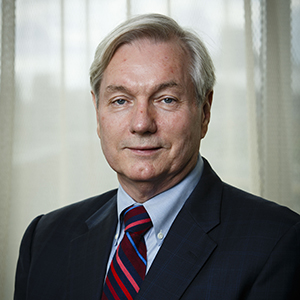
An international team of Ebola researchers, co-led by School of Public Health Professor Michael Osterholm, released its third report on efforts to prevent future epidemics of the disease.
The Ebola Vaccine Team B report highlights an Ebola candidate vaccine field efficacy trial completed during the West African epidemic that ended in 2016.
The team emphasized that renewed and continued global leadership is required to complete the complex task of licensing and delivering safe, effective, and durable Ebola vaccines that prevent outbreaks and quickly stop future epidemics.
“Much has been done to secure effective and safe Ebola vaccines, but much more needs to be done to address the challenge of a large outbreak, where public health is unprepared to quickly stop virus transmission,” says Osterholm, who co-chairs Team B and directs the University’s Center for Infectious Disease Research and Policy (CIDRAP).
CIDRAP and the UK’s Wellcome Trust launched the Ebola Vaccine Team B initiative in November 2014 to assist international efforts to develop safe and effective vaccines to stop the Ebola epidemic in West Africa.
The report details continuing work on Ebola research and development programs initiated or expanded during the 2013-16 West African epidemic. Progress has been made in moving potential Ebola vaccines forward and addressing other critical issues necessary for the delivery of Ebola vaccines in high-risk areas.
However, the report points out, there are still critical remaining gaps in preparedness for the next inevitable Ebola outbreak. The report also notes plans and protocols for vaccine stockpiles, management, maintenance, and deployment have not been fully developed. It also said high-level strategies for prevention and control of future epidemics are lacking and would benefit from additional scenario-based planning and modeling.
To address these gaps, the report includes a series of recommendations. The Ebola Vaccine Team B supports creating an international consortium focused on championing Ebola vaccines and resolving the remaining key issues related to global Ebola emergency preparedness. It also points out the need for:
- clarification and coordination of approvals for emergency use of vaccines
- plans and protocols for vaccine stockpiles
- high-level vaccination strategies for prevention and control of future Ebola epidemics
“By evaluating the current situation and developing these recommendations, we hope to galvanize global leadership on the path toward achieving comprehensive Ebola preparedness,” says Osterholm.

